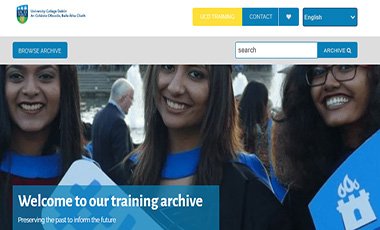Building and Developing Student Capabilities in Digital Preservation
Overview

This Learning Enhancement project has been funded through the HEA and the National Forum for the Enhancement of Teaching and Learning.
| PROJECT TITLE: | Building and Developing Student Capabilities in Digital Preservation |
|---|---|
| PROJECT COORDINATOR: | Dr Julie Brooks |
| MODULE NAME: | Archives Preservation & Acquisition |
| MODULE CODE: | ARCV41480 |
| STUDENT COHORT: | 27 Postgraduate students: 24 Full-Time & 3 Part-Time |
Background
The project relates to ARCV41480 Archives Preservation and Acquisition, a core 10 credit module on the MA in Archives and Records Management programme (Z020) delivered by the School of History. The programme holds professional accreditation from the Archives and Records Association (UK & Ireland) and its learning environment enables students to gain practical experience of various recordkeeping activities, often working in collaboration with external archival repositories. However, this is chiefly in relation to traditional, analogue materials.
A challenge in recent years has been providing students with the equivalent practical experiences in relation to born-digital materials, specifically around preservation and the related function of acquisition. While important digital preservation work is being undertaken by a number of Irish institutions, this remains in its relative infancy compared with the established understanding and practice underpinning work to preserve traditional, analogue formats. Because of the early stages of development of most digital preservation activity in archive and recordkeeping services in Ireland, opportunities for facilitating practical projects involving digital materials are extremely limited.
The rationale for this project was to enable students to gain practical experience of working with born-digital records and preservation systems, thereby building their levels of confidence when making the transition from student to new professional.
Goals
Objectives
- Develop student knowledge and confidence in digital preservation systems and processes. Provide students with an understanding of the design and functionality of a digital preservation system which meets the globally recognized digital preservation standard (the Open Archival Information System model) and supports the development of a digital repository with trusted status.
- Involve external digital preservation expertise to enhance the students’ learning experience by working with a digital preservation system developer and a key player in the vendor market. Preservica (UK).
- Enable students to experiment with some of the most commonly deployed processes, activities and tools involved in the acquisition and preservation of digital materials, allowing them to gain hands-on, practical experience in a ‘safe’ environment. This project therefore aimed at supporting students to begin the ‘try by doing’ in a teaching environment allowing them to build expertise and confidence in this most important of recordkeeping functions.
The Innovative Approach
Working with digital preservation system company Preservica based in the UK, I developed an interactive workshop which took place online rather than in-person due to the Covid 19 context.
In the planning stages, I had regular virtual meetings with the Preservica instructor to plan the workshop and discuss the specific aspects which I wanted the students to see and experience. The workshop used a demo system of the Preservica product which was set-up exclusively for the use of the MA Archives and Records Management programme. We tested this demo system and its various functionalities in advance. I assigned each student with a system ID to enable them to access it, experience its functionality and carry out various processes under the guidance of the Preservica personnel. In advance of the workshop, students were asked to test their log-in credentials and to download a folder of test files to their local environment.
On the day of the workshop, the workshop was led by me and the Preservica instructor and the students were able to first hear about the development of the system, learn more about the diverse range of organisations around the world using it, as well as understand its features and benefits.
Then, using the test files provided, each student had the opportunity to gain hands-on experience of uploading files, preparing them for ingest into the digital repository (ensuring file fixity via checksums, virus checking, adding metadata), carrying out ingest, and then once safely in the digital repository, students were able to work through key preservation actions and experience migrating files within the system.
The biggest benefit of the workshop was enabling the students to see and experience for the first time themselves the theory of the classroom put into practice and to a certain extent de-mystify some of their anxieties around working with digital rather than paper collections.
Results
Student feedback was overwhelmingly positive with one student describing the workshop as:
An amazing and valuable opportunity, the tutorial has equipped me with a basic technical skill in using a digital preservation tool which is invaluable. Indeed, I consider it as one of the main highlights of the Archives Preservation module.
One of the most effective aspects of the workshop was students being able to understand how the system can handle and automate key digital preservation processes that ensure the authenticity and integrity of the digital material. This makes it a very viable option for archive professionals in Ireland many of whom will be working in sole-operator contexts within their organisations.
A longer-term benefit of this initiative is that we have made important industry contacts, we will retain access to this demo system into the future, and it can be used going forward to set up practical exercises using digital materials. This was the first time the MA in Archives and Records Management programme has worked with an external commercial vendor to enhance and develop student learning and it has been an overwhelmingly positive experience for both students and staff.